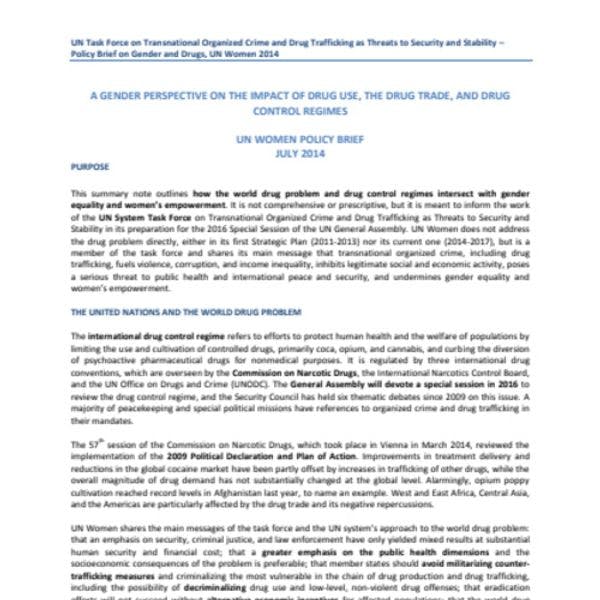Camino a la UNGASS: la ONU publica otra crítica devastadora de la guerra contra las drogas
El Relator Especial de las Naciones Unidas sobre el derecho a la salud, Dainius Pūras, ha publicado un informe que contiene una crítica devastadora de la guerra contra las drogas y los procesos de la ONU en torno a este tema. Más información, en inglés, está disponible abajo.
Suscríbase a las Alertas mensuales del IDPC para recibir información sobre cuestiones relacionadas con políticas sobre drogas.
A significant positive outcome has already emerged from next year’s UN General Assembly Special Session (UNGASS) on drugs in the form of much more direct engagement in key drug policy issues from a range of UN agencies - beyond the prohibitionist silo of the UN Office on Drugs and Crime (UNODC). Civil society organisations have, for years, been attempting to highlight the negative impacts of the international drug control system on issues relating to the core UN pillars of human rights, development, and peace and security. But these are not thematic areas that have been routinely evaluated or reported on in any consistent or in-depth way by the key UN drug control bodies – the UNODC, the International Narcotics Control Board (INCB) or the Commission on Narcotic Drugs (CND). You will not, for example, find chapters on the human rights or development implications of drug enforcement in the UNODC’s flagship annual 'World Drug Report'.
But the invited submissions to the UNGASS process from the wider family of UN agencies, representing a much more diverse body of thematic expertise, have not held back in tackling what has previously been off limits in the high-level UN drug debate. Stand out contributions include those from the UN Development Program, UN Women, the Office of the High Commissioner on Human Rights, and UNAIDs. And another outstanding submission has arrived this week from the UN Special Rapporteur on the Right to Health, Dainius Pūras.
Special rapporteurs are appointed by the Office of the High Commissioner on Human Rights and are mandated by the United Nations to "examine, monitor, advise, and publicly report" on specific human rights issues – often relating to a specific right, in this case the right of everyone to the highest attainable standard of mental and physical health. As independent experts serving in an advisory role they are not bound to any agency or government, and have – in the high level debate at least – an unusual level of freedom to act as officially mandated critics of whatever they deem appropriate within their specific remit. This page provides more information on the special rapporteur.
Click here to read the full article.
Keep up-to-date with drug policy developments by subscribing to the IDPC Monthly Alert
